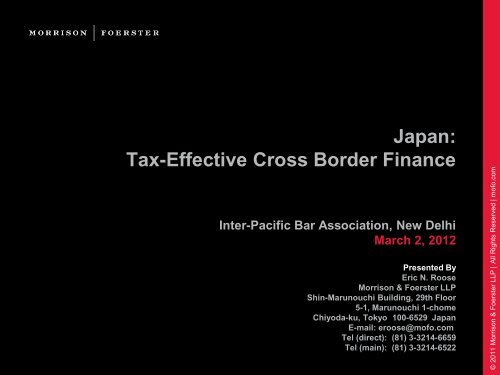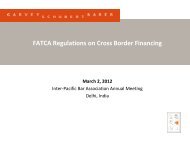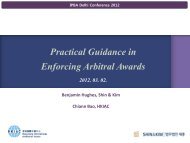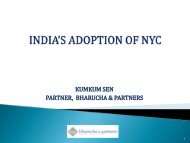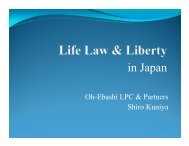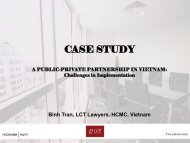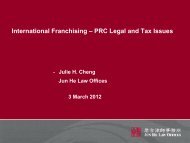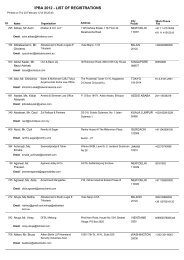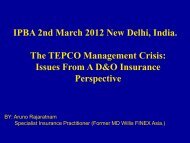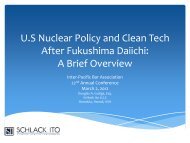Tax Effective Cross Border Finance - IPBA 2012
Tax Effective Cross Border Finance - IPBA 2012
Tax Effective Cross Border Finance - IPBA 2012
- No tags were found...
You also want an ePaper? Increase the reach of your titles
YUMPU automatically turns print PDFs into web optimized ePapers that Google loves.
© 2011 Morrison & Foerster LLP | All Rights Reserved | mofo.comJapan:<strong>Tax</strong>-<strong>Effective</strong> <strong>Cross</strong> <strong>Border</strong> <strong>Finance</strong>Inter-Pacific Bar Association, New DelhiMarch 2, <strong>2012</strong>Presented ByEric N. RooseMorrison & Foerster LLPShin-Marunouchi Building, 29th Floor5-1, Marunouchi 1-chomeChiyoda-ku, Tokyo 100-6529 JapanE-mail: eroose@mofo.comTel (direct): (81) 3-3214-6659Tel (main): (81) 3-3214-6522
The Basics• Japan is a high tax jurisdiction – 42% corporate tax rate (soon to bereduced to 38%, which is still high).• Interest on loans made by a Japan company to foreign affiliates mustbe made at fair market value basis (if not, donation income issues)• Interest on loans received by a Japan company subject to high tax.• Loans made by foreign affiliates to Japan subsidiaries are subject toJapan has thin-cap rules (which has a 3:1 safe-harbor)• Interest on loans by foreign affiliates are subject to a 20% WHT,which can be reduced by applicable tax treaty.•Exception: bond interest WHT is lower,15%•Exception: Euro-bond interest WHT is Zero•Exceptions: Treaty based (e.g., US tax treaty exempts interest on pension loans)This is MoFo. 2
<strong>Tax</strong> Planning - Japan Corporates• Locating interest deductions in the jurisdiction of a global groupcompany with the highest corporate tax rate is generally a good idea•Plus, this financing model comports with Japanese business reality, since mostJapanese corporates obtain group financing through Japanese bank loans toJapan headquarters companies (Japan Parent) or Japan bank loans to foreignaffiliates guaranteed by the Japan Parent.• But interest on loans by Japan Parent to foreign subsidiaries issubject to full taxation in Japan, and since the interest rate on aforeign currency loan to a subsidiary is higher than the cost of JPYborrowing by the Parent, the spread is taxed at Parent level at veryhigh Japan corporate rates.•Also, if the Japan Parent on-loans to foreign subsidiaries (Foreign Affiliate) orguarantees that Foreign Affiliate’s loan, Thin-Cap rules applicable to ForeignAffiliate may limit the interest deduction• One Possible Solution: Participation Exemption <strong>Tax</strong> PlanningThis is MoFo. 3
New Japanese Participation Exemption Regime Under 2009 <strong>Tax</strong> Reform• Worldwide <strong>Tax</strong>ation of Repatriated Profits. JCo is generally subject to Japanese taxon dividends from foreign subsidiary companies.• New Participation Exemption. From April 1, 2009, JCo may claim a 95% deductionfor repatriated profits from ≥25%-owned foreign subsidiaries.• ≥25%-Ownership (Participation). ≥25% participation is generally based on voting control or number ofshares. The 25% threshold may be reduced under an applicable tax treaty.This is MoFo. 4
Application of Participation Exemption – ETR of 2%No Participation ExemptionNew Participation ExemptionJ-CO(Japan)Income 595<strong>Tax</strong> (175)*Net 420J-CO(Japan)Income 700<strong>Tax</strong> (14)*Net 686JapanJapan100%Dividend 700WHT (0)Net 686Germany10%Dividend 700WHT(15%) (105)Net 595NetherlandsGermanyHoldCo(Netherlands)10%Dividend Income 700<strong>Tax</strong> (0)Net 700Dividend 700WHT (0)Net 686SubCo(Germany)Business Income 1,000<strong>Tax</strong> (300)Net 700SubCo(Germany)Business Income1,000<strong>Tax</strong> (300)Net 700BusinessBusiness*175 = (595+105) x 40% - 105 : As the ownership percentage is less than 25%, theParticipation Exemption is not applicable (and thus JCo can claim a credit for foreignwithholding tax).* 14 = 700 x 5% x 40%: As the ownership percentage is 25% or more, theParticipation Exemption is applicable.This is MoFo. 5
But WHT on Interest Not Creditable in Japan• No Direct Foreign <strong>Tax</strong> Credit. If JCo claims a 95% deduction for repatriated profits,JCo cannot claim a credit for foreign withholding tax imposed on dividends.• No Indirect Foreign <strong>Tax</strong> Credit. Under prior law, JCo was entitled to claim aforeign tax credit (FTC) for foreign net income taxes assessed on ≥25%-owned firstand second tier foreign subsidiaries, or first tier subsidiary distributions to JCo.Under the new (95%) participation exemption regime, no FTC is allowed; instead a95% deduction for repatriated profits is now permitted.• One Possible Solution: Interpose Foreign Intermediary Holdco SubsidiaryThis is MoFo. 6
Reduction of Withholding <strong>Tax</strong> on Dividends from Foreign SubsidiaryHigher Withholding <strong>Tax</strong>Reduced Withholding <strong>Tax</strong>JapanJ-CO(Japan)Income 595<strong>Tax</strong> (14)*Net 581*(595+105) x 5% x 40%JapanJ-CO(Japan)100%Income 700<strong>Tax</strong> (14)*Net 686*700x 5% x 40%Dividend 700WHT (0)Net 686Germany100%Dividend 700WHT(15%) (105)Net 595NetherlandsGermanyHoldCo(Netherlands)100%Dividend Income 700<strong>Tax</strong> (0)Net 700Dividend 700WHT (0)Net 686SubCo(Germany)Business Income 1,000<strong>Tax</strong> (300)Net 700SubCo(Germany)Business Income1,000<strong>Tax</strong> (300)Net 700BusinessBusiness* 14 = (595 + 105) x 5% x 40%: As the ownership percentage is 25% or more, theParticipation Exemption is applicable (and thus JCo cannot claim a credit forforeign withholding tax).* 14 = 700 x 5% x 40%: As the ownership percentage is 25% or more, theParticipation Exemption is applicable(and thus JCo cannot claim a credit for foreignwithholding tax).This is MoFo. 7
Joint Venture with Foreign PartnerBefore 2009 <strong>Tax</strong> Reform (No Participation Exemption)After 2009 <strong>Tax</strong> Reform (Participation Exemption)J-CO(Japan)Income 1,000<strong>Tax</strong> (400)*Net 600J-CO(Japan)Income 1,000<strong>Tax</strong> (20)*Net 980JapanJapanCaymanJV Partner(Country X)50%Dividend 1,000CaymanJV Partner(Country X)50%Dividend 1,00050%HoldCo(Cayman)Income 1,000<strong>Tax</strong> (0)Net 1,00050%HoldCo(Cayman)Income 1,000<strong>Tax</strong> (0)Net 1,000InvestmentInvestment* 400 = 1,000 x 40% As JCo does not own more than 50% of Holdco, Japanese CFC rule isnot applicable.* 20 = 1,000 x 5% x 40%: As the ownership percentage is 25% or more, theParticipation Exemption is applicable. As JCo does not own more than 50% ofHoldco, Japanese CFC rule is not applicable.This is MoFo. 8
Using Holdco – Beware of Japanese Anti-<strong>Tax</strong> Haven Rule• Current <strong>Tax</strong>ation on Net Income of “<strong>Tax</strong> Haven” Foreign Subsidiaries. JCo is generallysubject to current Japanese tax on net income of certain “tax haven” foreign subsidiaries,even if no profits are repatriated to JCo.• “<strong>Tax</strong> Haven” Company. Generally, a foreign company is a “tax haven” company if:− >50% (by vote, number of shares, or dividend rights) is held (or attributed to) Japanese tax residents;− no income tax is imposed by its jurisdiction of incorporation, or the effective income tax rate so imposed is≤25%; and− the foreign company does not conduct an active business in its place of incorporation (the “Active BusinessTest”).• If the foreign subsidiary’s main business is the holding of shares, such foreign subsidiarygenerally fails to meet the Active Business Test.• However, under the 2010 tax reform, if the foreign company is classified as a“Regional Headquarter Company”, it meets the Active Business Test.This is MoFo. 9
Regional Headquarters Company Exception – The Fine Print• Under the 2010 <strong>Tax</strong> Reform, a new exception to the Anti-<strong>Tax</strong> Haven Rule was added for an SFSwhich is a "Regional Headquarters Company" (RHQ). To qualify as a RHQ, the specified foreignsubsidiary (“SFS”) must satisfy the following requirements at the end of each fiscal year:(a) 100% of the shares of the SFS are directly or indirectly held by a Japanese company;(b) the SFS must provide at least two Controlled Companies with management services; and(c) the SFS must have a fixed place of business (an office, shop or factory) and employees(those who are mainly involved with the management services, excluding directors of the SFS andfamily members of the directors) in the country where its head office is located.• For this purpose, a Controlled Company (“CC”) is defined as a foreign company which satisfiesthe following at the end of each fiscal year of the RHQ providing management services to theforeign company:(i) At least 25% of the shares and the voting rights of the company is directly held by an RHQ;(ii) The company has employees engaged in business carried on in the country where its headoffice is located; and(iii) The company is controlled (that is, >50% ownership), directly or indirectly, by the Japaneseshareholder company of the RHQ, and is a first, second, or third tier subsidiary of the RHQ.• Management services are as services provided by an SFS under a contract between the SFS andits CCs, in connection with decisions or changes of the CCs' business policy, which are essentialto its business. The services need to contribute to the enhancement of the profitability of the CCsby providing such services collectively to the CCs.This is MoFo. 10
Regional Headquarter Company Singapore ExampleBefore 2010 <strong>Tax</strong> ReformAfter 2010 <strong>Tax</strong> ReformJ-CO(Japan)Income 1,000<strong>Tax</strong> (400)Net 600J-CO(Japan)JapanSingapore100%JCo is subject to current Japanese tax onHoldCo profits.JapanSingapore100%JCo is not subject to current Japanese taxon HoldCo profit, if HoldCo is classified as aRegional Headquarter.HoldCo (RegionalHeadquarter- Singapore)Management Fee 1,000<strong>Tax</strong> (0)Net 1,000HoldCo (RegionalHeadquarter- Singapore)Management Fee 1,000<strong>Tax</strong> (0)Net 1,000OffshoreOffshoreManagement Fee100%100%Management FeeManagement Fee100%100%Management FeeForeign SubXForeign SubYForeign SubXForeign SubYThis is MoFo. 11
Japan• Questions?This is MoFo. 12


